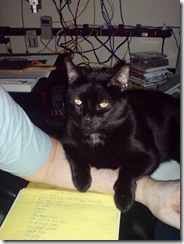Tuesday Time-Wasting Tip-Off #13: Why Conducting Research Can Be Counter-Productive
There are few endeavours in life that require you to immediately stop what you are doing, go off and read a couple of pages in a book, browse through Google Groups or search Stackoverflow for a close enough answer and then return to work.
And yet, this is what people do all the time.
Stuck for an idea? Research!
Do not feel like writing? Research!
Cannot seem to figure out the solution to a problem? Research!
Most office workers are constantly shifting gears, going from work to research, and back to work, and then back to research, throughout their work day. Talk about inefficient.
Welcome to this week’s Tuesday Time-Wasting Tip-Off, where you might just find that conducting research is actually counter-productive to the creation process.
Perform Your Research During Research Time
Let us be up front about this, never, ever let facts, or the lack of them, get in the way of anything you do. For most of the tasks you perform and projects you undertake, the gather of factual information, or further information, whilst in the middle of the creative process is just a hindrance to progress.
 Many projects and sizable tasks need and should be broken up in to discrete phases, first research and due diligence, followed by whatever the task entails to “make something happen.” Mixing different types of work just slows the whole enterprise.
Many projects and sizable tasks need and should be broken up in to discrete phases, first research and due diligence, followed by whatever the task entails to “make something happen.” Mixing different types of work just slows the whole enterprise.
As an example, writing has, and should have, very discrete phases, if you want to be very, very productive. Idea generation, research, writing, editing, further research, fact checking, are all examples of these individual phases and a good, and above all, disciplined writer knows when to do each phase and when not to try and shift gears and combine two phases in to one.
Yeah, but what happens when you are writing like a madman and hit a wall and need to know some information to continue?
Ask yourself this, is the information vital to the narrative or plot point right now that you cannot write another word without filling in the missing blanks on the information?
Research when it is time to research. Write when it is time to write. Once you are writing, should you need more research, just put in a quick note indicating a lack of information and further research to be done, then get right back to writing.
I know of many writers who, when they are not sure of a fact, or need to perform research on something, whilst in the middle of their flow, will just insert the two letters, TK, [insert link to a writer who uses TK] and just keep on writing as though they had the information.
The letters T and K are not in any English words [verify this fact] very few English Words, so it becomes exceedingly easy to perform a find and replace on them once the actual writing work is done and the writer returns to doing further research. By doing it this way, the writer can remain in their flow state and become super productive without being bogged down in details.
Personally, I do not use the TK method, instead preferring the use of [square brackets] with a comment inside them to remind me what I needed to do. I find that the usage of square brackets allows me to search quickly and they stand out like a sore thumb when I format just those characters in Microsoft Word to display as bright neon pink.
When programming I will insert JRL (my initials), followed by the six digit date, which I can easily search for in all of my source code files. This little tag in the source reminds me to write more error checking, clean up a particular section of code, or just figure out why in the durn hell it does not work the way I expected it to.
This same principle applies to many other tasks and activities too. A placeholder graphic in a website design, a discordant audio effect in place of the real one during development of a video game, a neon green or hot pink image as the texture on a 3D model can all substitute for the real item when what you need to do is the work and not worry about the details.
So many people fall in to the trap of “perfect research.” They avoid putting off the actual task, such as writing, until the perfect amount of research is completed. Sometimes it pays to have only partial research, with incomplete information, and just begin the required task, filling in the missing details later.
A good enough solution that takes advantage of the opportunity available to you now is far, far better than a perfect solution delivered after the opportunity has passed you by.
What other areas of your life can you put TK on and return to later, after you have become super productive?